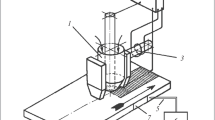Abstract
Results from measurements of the electrical resistivity of copper and aluminum conductors under the action of a plane shock wave, and also analysis of the relationship between the electrical resistivity and the hydrostatic pressure and of the theoretical temperature dependence of the electrical resistivity, has made it possible to elucidate the role of defect formation due to the plastic deformation of the metal and to determine its contribution to the increase in electrical resisitivity of the metal. It has been established that the concentration of defects depends on the pressure gradient in a plane shock wave.
Similar content being viewed by others
References
L. M. Lee, “Nonlinearity in the piezoresistance coefficient of impact-loaded manganin,” J. Appl. Phys.,44, No. 9, 4017–4022 (1973).
J. J. Dick and D. L. Styris, “Electrical resistivity of silver foils under uniaxial shock-wave compression,” J. Appl. Phys,46, No. 4, 1602–1617 (1975).
A. Y. Lowson, “The effect of hydrostatic pressure on the electrical resistivity of metals,” in: Advances in the Physics of Metals [Russian translation], Vol. 3., Metallurgizdat, Moscow (1960), pp. 7–52.
C. Kittel, Introduction into Solid State Physics [Russian translation], Fizmatgiz, Moscow (1968).
V. N. Zharkov and V. A. Kalinin, Equations of State for Solids at High Temperatures and Pressures [in Russian], Nauka, Moscow (1968).
P. A. Urtiew and R. Grower, “Temperature deposition caused by shock interactions with material interfaces,” J. Appl. Phys.45, No. 1, 140–145 (1974).
V. N. Rodionov and A. I. Goncharov, “Possibility of strain measurement in the shock compression processes,” Fiz. Goreniya Vzryva,21, No. 2, 116–120 (1985).
A. I. Goncharov and V. N. Rodionov, “Electrical resistivity of copper and aluminum under shock-wave loading,” Abstracts of reports at the 2nd All-Union Conference “Lavrent'ev's readings in mathematics, mechanics, and physics,” Kiev (1985), pp. 72–73.
Additional information
Institute of Dynamics of Geospheres, Russian Academy of Science, Moscow 117334. Translated from Fizika Goreniya i Vzryva, Vol. 31, No. 3, pp. 47–53, May–June, 1995.
Rights and permissions
About this article
Cite this article
Rodionov, V.N., Goncharov, A.I. Effect of plastic deformation on the electrical resistivity of metals. Combust Explos Shock Waves 31, 313–318 (1995). https://doi.org/10.1007/BF00742676
Received:
Issue Date:
DOI: https://doi.org/10.1007/BF00742676




